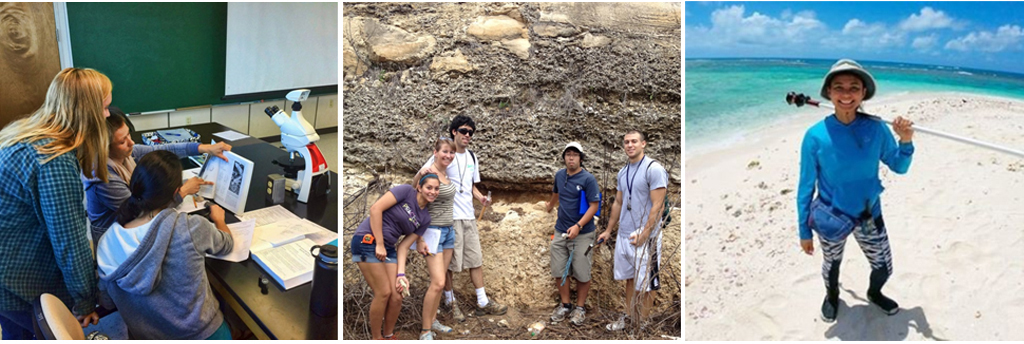Undergraduate Degree Programs

Earth scientists apply their STEM skills with expertise in computer, laboratory, field work on problems related to the solid earth and its interactions with the hydrosphere and atmosphere. Environmental scientists address issues pertaining to the Earth, ecosystems, and human activity. Earth and environmental science professionals work in industry, government agencies, or academia with client-stake holders, policy makers, engineers, developers, lawyers, and/or business owners on many issues including: clean water resources, natural hazards, natural resources, land use and site development, beach erosion and coastal resources, renewable energy, and sea level rise.
The Department of Earth Sciences offers two Bachalaureate Degrees and four tracks to prepare students for a variety of careers in Earth and Environmental Sciences (See the geoscience careers page of the American Geoscience Institute).
B.S. in Earth Sciences
The Bachelor of Science in Earth Sciences is a rigorous science degree for careers in academia, industry, or with government agencies
The Bachelor of Science Research Emphasis Track provides a customizable course curriculum and mentorship with faculty on a research thesis.
B.A. in Environmental Earth Science
The Bachelor of Arts in Environmental Earth Science has a more flexible curriculum for careers in industry or with government agencies.
The Earth Science Education Track is geared especially for careers in science education. In coordination with the College of Education's Post-Baccalaureate certificate program students can become certified to teach science in Hawai'i
Minor in Earth Science
The Minor is flexible and can provide either an introductory survey of Earth Sciences, or emphasize sub-discipline areas of particular interest to the student.
Joining the Dept. of Earth Sciences and SOEST
Earth Science B.S. and B.A. majors are supported by academic advisors within the Department of Earth Sciences, the SOEST Student Academic Services (SAS), as well as our student mentoring programs. By joining the Department within the School of Ocean and Earth Science and Technology (SOEST), you join our ohana (family) of students and faculty engaged in a rich diversity of academic and research fields of study.
Professional Transferable Skills Obtained
- Knowledge of the geological sciences and sub-disciplines in a global context and with a Hawaiian Islands focus.
- Using scientific principles, particularly the fundamental principles of physics, chemistry, biology, and mathematics, in the study of Earth and planetary systems.
- Critical thinking, particularly problem solving and using the scientific method. Throughout our curriculum students are asked to define problems, collect and analyze appropriate data, and apply various methodologies and techniques to solve and draw defensible conclusions relating to scientific problems.
- Global awareness and social relevance, particularly of geologic phenomena. Throughout their coursework students have multiple opportunities to examine the interaction of natural processes and humankind. Special emphasis is given to contributions of geological inquiry to social, cultural, and economic aspects of the human condition.
- Verbal and written communications. Students majoring in Earth Sciences or Environmental Earth Science are given training to develop their oral and written communication skills. This includes in-class presentations, written reports, and group projects emphasizing information exchange in a clear concise manner.
For Current Students

